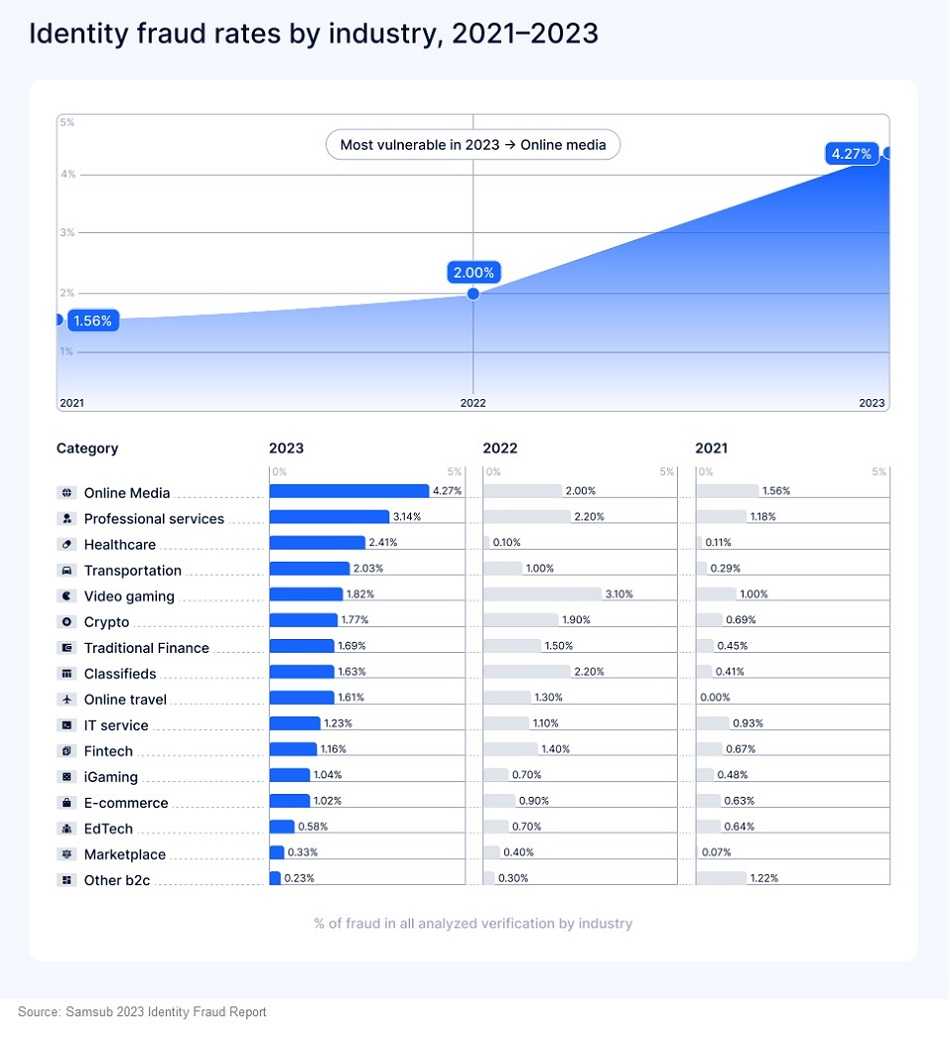With AI-enabled fraud making its way around the world, organizations and their customers should expect to see even more incidents of fraud. It has become a challenge between an organization’s identity verification measures and those who find ways to exploit them for financial gain. With help from Sumsub’s 2023 Identity Fraud Report, here’s a look around the corner at trending fraud attacks, and those we can expect to see more of today.
AI Deepfake Authorized Fraud
AI-enabled deepfakes are growing like wildfire, more than ten times over in one year. With the help of AI, deepfakes impersonate a victim using digitally altered images, audio, or video to orchestrate identity fraud. In North America alone, there’s been a 1,740% increase in deepfake fraud.
While we’ve heard of the scams involving desperate pleas from relatives in trouble, deepfake fraud often impersonates a financial institution (FI), convincing customers to send payments to the fraudster. This is also called “authorized fraud” or “authorized push payment” (APP) because the victim, believing the scam is legitimate, authorizes the payment. Research shows the global cost of financial crimes and fraud are projected to cost FIs and you more than $40 billion by 2027.
If you are contacted by phone or email to make some sort of payment and you cannot be sure it’s truly who you think it is or if the request just sounds a bit odd, contact your financial institution using a number you already have on file for them or find from checking their official website or app to contact them for verification. The same goes if you think it’s a friend or relative who claims to be in a major jam. Hang up and call them back separately.

Identity Fraud for Account Takeovers
Last year, global cases of account takeovers (ATOs) grew by 155%, with two particular types of ATOs as the main problem. One happens when a victim believes a fraudster and they unwittingly hand over the information needed to take over their own account. The other is a weakness in an organization’s authentication checks failing to prevent scammers from taking over all types of accounts. While there isn’t much an individual can do about the latter, there is something for the former. Avoid handing you’re your credentials or payment card information to anyone you cannot be 100% confident is deserving of it. Check websites you use for making any purchases for the lock icon, the https://, and correct URL spellings. Keep an eagle eye out for any letters that might easily be replaced with numbers or special characters. This may be replacing a lower-case “L” with a number 1 for instance.
Fake ID’s Are A Breeze
Generative AI (GenAI) is a helpful forgery tool for creating fake documents and identities and websites like OnlyFake create fake IDs fast and cheap. These bogus IDs have passed “Know Your Customer” (KYC) verification steps used by FIs that confirm the identity of customers. In one case, an ID created by OnlyFake passed authentication at a cryptocurrency exchange.
What can you do? You can be sure to keep your personally identifying information as private as possible. Never post information such as your social security number, driver’s license number, or birthdate on public websites such as on social media. Remember that email is also not a secure form of communication, usually. Consider anything you send that way as available to peeping eyes.
Money Mules = Money Laundering
Young people under the age of 21 are particularly susceptible to money mule fraud. Fraudsters use the identity credentials and accounts of money mules to launder their ill-gotten funds. In the U.S., a money mule laundered over $2 million for a criminal he met online. The fraudster earned 5 years in jail for scamming a mule who believed the funds went toward purchasing a home.
If someone asks you to transfer money to an account with a promise of some payment, no matter the sob story they may provide, just don’t do it. It’s likely to be fraud and it’s also illegal.
Preventing fraud today is a challenge for sure, but it’s one well worth the effort to take some time to avoid.